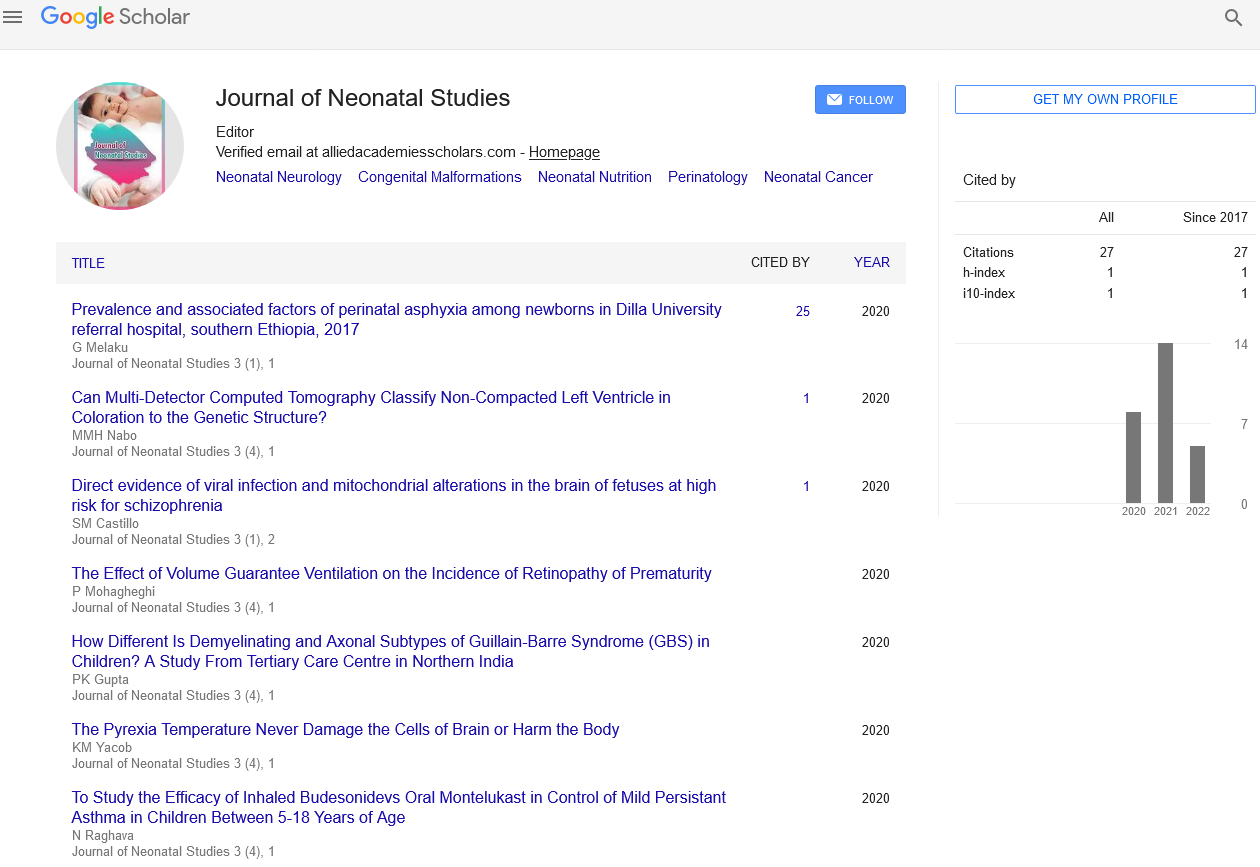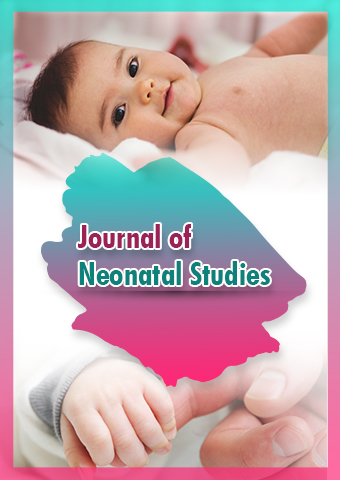Mini Review - Journal of Neonatal Studies (2023) Volume 6, Issue 2
Neonatal Nursing and the Specialized Care
Oglat Ammar*
Department of Medical Imaging, Faculty of Applied Medical Sciences, Hashemite University, Zarqa, Jordan
Department of Medical Imaging, Faculty of Applied Medical Sciences, Hashemite University, Zarqa, Jordan
E-mail: ammar.o@edu.jd
Received: 1-Apr-2023, Manuscript No. jns-23-95940; Editor assigned: 3-Apr-2023, PreQC No. jns-22- 95940(PQ); Reviewed: 17-Apr-2023, QC No. jns-22-95940; Revised: 21- Apr-2023, Manuscript No. jns-22- 95940(R); Published: 28-Apr-2023; DOI: 10.37532/jns.2023.6(2).32-34
Abstract
Neonatal nursing is a specialized branch of nursing that focuses on providing care to new-born infants, particularly those who are born prematurely or with health complications. This field of nursing requires specialized skills and knowledge to provide the highest quality care to these vulnerable infants and their families. Neonatal nurses work in a variety of settings, including Neonatal Intensive Care Units (NICUs), nurseries, and delivery rooms. They work alongside physicians, respiratory therapists, and other healthcare professionals to provide the best possible care for these newborns. Neonatal nursing is a specialized branch of nursing that focuses on the care of new-born infants, particularly those who are premature, have low birth weight, or are otherwise medically fragile. The neonatal period, which encompasses the first 28 days of life, is a critical time for new-borns as they transition from the protected environment of the womb to the outside world. In this article, we will explore the importance of neonatal nursing and the specialized care that it provides to these vulnerable infants.
Keywords
Neonatal nursing • Neonatal intensive care unit • Respiratory • Newborns
Introduction
The responsibilities of neonatal nurses vary depending on the setting in which they work. In NICUs, they are responsible for monitoring the vital signs of premature or sick infants, administering medications, and providing nutrition through Intra Venous (IV) or tube feeding. They also provide support to the parents of these infants, helping them understand their baby’s condition and care for their child once they leave the hospital. In delivery rooms, neonatal nurses assist with the birth of premature infants and provide immediate care to infants who require resuscitation. They may also assist with the care of infants who are born with health complications or congenital abnormalities [1].
The education and training required to become a neonatal nurse is extensive. Neonatal nurses typically have a bachelor’s degree in nursing, and many have additional certification in neonatal nursing. They must also be licensed to practice nursing in their state. Neonatal nurses must have a deep understanding of the unique needs of premature infants and those born with health complications. They must be able to recognize signs of distress and respond quickly to provide lifesaving care. They must also be able to communicate effectively with parents and other healthcare professionals to ensure that the infant receives the best possible care. In addition to their medical knowledge, neonatal nurses must also possess strong interpersonal skills. They must be compassionate and empathetic, able to provide emotional support to parents who may be experiencing intense stress and anxiety. They must also be able to work well as part of a team, collaborating with physicians, respiratory therapists, and other healthcare professionals to provide the best possible care for these infants.
Discussion
The role of a neonatal nurse
A neonatal nurse is a registered nurse who has undergone specialized training in the care of new-born infants. They work in Neonatal Intensive Care Units (NICUs) and other settings where neonatal care is provided. The role of a neonatal nurse is to assess and monitor the health of new-borns, administer medications and treatments, and provide support to the family. Neonatal nurses must have a strong understanding of the unique needs of new-borns, including their developmental stages and the potential complications that may arise during the neonatal period. They must also be skilled in the use of specialized equipment, such as ventilators and incubators that are used to support the health and development of premature or critically ill infants [2, 3].
The importance of specialized care
Neonatal nursing is an essential component of the healthcare system, as it provides specialized care to new-borns that require medical attention. Premature infants, for example, may require respiratory support, intravenous nutrition, and other interventions to support their growth and development. Infants who are born with medical conditions or birth defects may require surgical intervention or other specialized treatments. The specialized care provided by neonatal nurses is critical to the health and wellbeing of newborns. Infants who receive appropriate neonatal care are more likely to survive and thrive during the neonatal period and beyond. They may also experience fewer complications and have better long-term outcomes [4, 5].
Challenges in neonatal nursing
Neonatal nursing is a challenging and demanding field that requires specialized knowledge and skills. Nurses in this field must be able to manage complex medical conditions, work with fragile and critically ill infants, and provide emotional support to families who are going through a difficult time. One of the biggest challenges in neonatal nursing is managing the emotional impact of caring for critically ill infants. Neonatal nurses must be able to maintain a professional demeanor while also providing empathetic and compassionate care to families who are experiencing the stress and anxiety that come with having a sick or premature infant. Another challenge in neonatal nursing is managing the high-tech equipment that is used to support the health and development of newborns. Neonatal nurses must be skilled in the use of equipment such as ventilators, incubators, and monitoring devices, and must be able to troubleshoot and respond quickly to any issues that may arise [6].
Conclusion
Neonatal nursing is a vital field of nursing that requires specialized skills and knowledge to provide care to new-born infants. Neonatal nurses work in a variety of settings, Including NICUs and delivery rooms, to provide the best possible care to these vulnerable infants and their families. They play a critical role in saving the lives of premature and sick infants, and their work is essential to the health and well-being of these new-borns [7, 8].
Neonatal nursing is a critical component of the healthcare system that provides specialized care to new-born infants who require medical attention. The role of a neonatal nurse is to assess and monitor the health of new-borns, administer medications and treatments, and provide support to the family. Neonatal nurses must have a strong understanding of the unique needs of new-borns, including their developmental stages and the potential complications that may arise during the neonatal period. The specialized care provided by neonatal nurses is essential to the health and wellbeing of new-borns, and can have a significant impact on their long-term outcomes. While neonatal nursing can be challenging and demanding, it is a rewarding and fulfilling career that allows nurses to make a meaningful difference in the lives of their patients and their families [9, 10].
Acknowledgement
None
Conflict of Interest
None
References
- de Carvalho RM, Mazzer N, Barbieri CH. Analysis of the reliability and reproducibility of goniometry compared to hand photogrammetry. Acta Ortop Bras. 20, 139-49 (2012).
- Naylor JM, Ko V, Adie S et al. Validity and reliability of using photography for measuring knee range of motion: a methodological study. BMC Musculoskelet Disord. 12, 77 (2011).
- Li MK, Howard DP, King R. A picture tells a thousand words smartphone-based secure clinical image transfer improves compliance in open fracture management. Injury. 50, 1284-7 (2019).
- Kazemi T, Lee KC, Bercovitch L. Just a quick pic: Ethics of medical photography. J Am Acad Dermatol. 80, 1172-4 (2019).
- Archibald DJ, Carlson ML, Friedman O. Pitfalls of nonstandardized photography. Facial Plast Surg Clin North Am. 18, 253-66 (2010).
- de Meijer PP, Karlsson J, LaPrade RF et al. A guideline to medical photography: a perspective on digital photography in an orthopaedic setting. Knee Surg Sports Traumatol Arthrosc. 20, 2606-11 (2012).
- Uzun M, Bulbul M, Toker S et al. Medical photography: principles for orthopedics. J Orthop Surg Res. 9, 23 (2014).
- Kim SH, Sobez LM, Spiro JE et al. Structured reporting has the potential to reduce reporting times of dual-energy x-ray absorptiometry exams. BMC Musculoskelet Disord. 21, 248 (2020).
- Körber A, Rietkotter J, Grabbe S et al. Three-dimensional documentation of wound healing: first results of a new objective method for measurement. J Dtsch Dermatol Ges. 4, 848-54 (2006).
- Wang S, Zhang Q, Huang W et al. A new smart mobile system for chronic wound care management. IEEE Access. 6, 52355-65 (2018).
Indexed at, Google Scholar, Crossref
Indexed at, Google Scholar, Crossref
Indexed at, Google Scholar, Crossref
Indexed at, Google Scholar, Crossref
Indexed at, Google Scholar, Crossref
Indexed at, Google Scholar, Crossref
Indexed at, Google Scholar, Crossref
Indexed at, Google Scholar, Crossref
Indexed at, Google Scholar, Crossref

